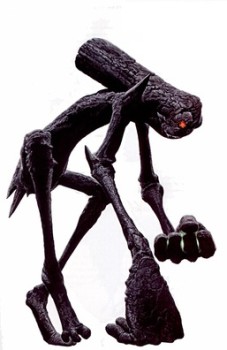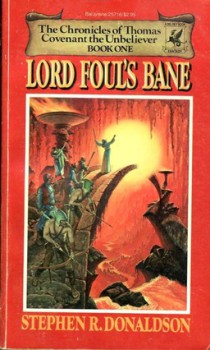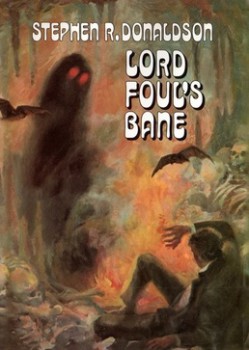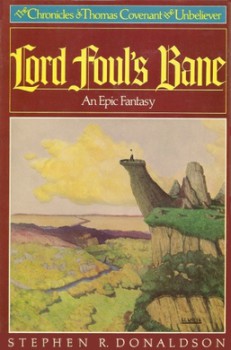Against Despair: Lord Foul’s Bane by Stephen R. Donaldson
“To the Lords of Revelstone, I am Lord Foul the Despiser; to the Giants of Seareach, Satansheart and Soulcrusher, The Ramen name me Fangthane. In the dreams of the Bloodguard, I am Corruption. But the people of the Land call me the Gray Slayer.”
Lord Foul to Thomas Covenant
Lord Foul’s Bane came out in 1977, one of two books pulled from the submissions pile by the del Reys in their search for another Tolkien. The first was the Lord of the Rings-derived The Sword of Shannara (reviewed here), which makes total sense. But this? It’s a work full of crushing despair along with a miserable and unpleasant protagonist who refuses to be the hero people want and need. He also rapes a 16-year old girl. This is not the rolling green hills of Middle-earth and hobbits.
I can remember the reactions of people in my circle. My father hated it all around. My friend’s mom, a high school English teacher, loathed it as well, supposedly for its criminally bad prose alone. I myself found it dense, impenetrable, and dull. I was only twelve but I had already read LotR twice, so I just assumed it was no good. The only person I knew who read it and its sequels was a friend who read any and all fantasy without a drop of discrimination.
Even today much of the reaction toward Donaldson’s series is negative. In Modern Fantasy: The Hundred Best Novels, David Pringle describes it as an “unearned epic.” During Cora Buhlert’s dustup with Theo Beale over morality in fantasy she said she could never get past Covenant being a rapist. James Nicoll wrote that Covenant should win a “special lifetime achievement award” for the “most unlikeable supposedly sympathetic protagonist.”
I finally read Lord Foul’s Bane a few years ago and found it a fascinating book. I got sidetracked from reading the rest of the initial trilogy but my present desire to read some epic high fantasy brought me back to it. Also, my friend, Jack D., keeps asking me if I’ve read these and if not why not. I don’t think he reads a ton of fantasy so his love for Donaldson’s work is something that I found especially intriguing. So I went back and came away a captive of Donaldson’s strange first novel.

Thomas Covenant is a man alone. An author of a successful first book, stricken with leprosy; deserted by his wife who took their son with her. The townspeople fear his disease to the point they’ve started paying his bills so he won’t have any reason to come into town anymore. To survive his infirmity he practices a constant self-examination called Visual Surveillance of Extremities. If he drops his vigilance he may unknowingly injure himself which can lead to infection, then gangrene, then amputation. Already he has lost two fingers on his right hand.
Covenant refuses to be utterly ostracized from humanity, and insists on still paying his bills in person. One day his excursion leads to his translation to another world. After a strange conversation with an old man in an ochre robe, Covenant is hit by a car whereupon he awakes in the presence of two evil beings — Drool Rockworm, a monstrous creature with a “head like a battering ram,” and Lord Foul the Despiser. The latter sends the reluctant Covenant on a mission to the Council of Lords to tell them he has returned. If Covenant doesn’t go, Drool will destroy the Lords in two years; if he does, they will be destroyed in forty-nine years by other forces. Despite his refusal, Covenant is transported out of Drool’s caverns and sent on his way into the wider, cleaner parts of “the Land.”
Ere fifty pages are passed, the event that has garnered Thomas Covenant his vile reputation occurs. For three years Covenant has been living alone and damaged. He cannot accept the lush new reality of the Land. When young Lena finds him and heals his wounds, eventually regenerating his lost nerves, he verges into madness. Despite the warm hospitality of Lena and the willingness of her mother, Atiaran, to take him to the Lords, he attacks and rapes the girl. He justifies it by reasoning that the Land is only a dream, and the sudden return of feeling after three years of undiminished sexual desire is too overpowering to resist.
I think this horrifying event is a gauntlet thrown down by Donaldson. James Nicoll is wrong in saying Covenant is supposed to be sympathetic. Absolutely not. The Thomas Covenant of our world is sympathetic, the one in the Land is not. In the beginning, when he is still coming to grips with what he can only believe is a dream, it’s possible to have sympathy for his staggering sanity, but the reader soon realizes that he’s an insufferable jackass. He rarely fails to find the worst thing to say at the worst time, and rebuffs nearly all attempts to engage him on a personal level.
 Despite not having read the two sequels, The Illearth War and The Power That Preserves, I suspect that this is Donaldson’s plan for Covenant’s character development. Not only has Covenant been given a mission by Lord Foul, but with his reduced finger count and white gold wedding band (an artifact of tremendous, nearly uncontrollable power in the Land) he looks like the ancient hero Berek Halfhand. The Lords and people of the Land take him for a savior in their hour of gravest need. Can a man capable of the detestable act of rape, unwilling to believe in the very existence of the Land outside of his own unconscious mind, rise to being a hero? Can he become a good man, or at least one capable of good acts? By the end of Lord Foul’s Bane there are definite hints of those possibilities, even if he remains a jackass.
Despite not having read the two sequels, The Illearth War and The Power That Preserves, I suspect that this is Donaldson’s plan for Covenant’s character development. Not only has Covenant been given a mission by Lord Foul, but with his reduced finger count and white gold wedding band (an artifact of tremendous, nearly uncontrollable power in the Land) he looks like the ancient hero Berek Halfhand. The Lords and people of the Land take him for a savior in their hour of gravest need. Can a man capable of the detestable act of rape, unwilling to believe in the very existence of the Land outside of his own unconscious mind, rise to being a hero? Can he become a good man, or at least one capable of good acts? By the end of Lord Foul’s Bane there are definite hints of those possibilities, even if he remains a jackass.
By the end of Lord Foul’s Bane, only Thomas Covenant emerges as someone the reader knows. Every other character is too focused on the struggle against Drool and Lord Foul. The giant Saltheart Foamfollower has some personality, but then he’s the only person to force his way through Covenant’s defenses.
Covenant’s primary interaction is with the Land, which effectively becomes the other major character in this book. It is a beautiful, wonder-filled place. As he spends time in the Land, Covenant gains the ability to feel its health, as well as its sickness when wounded. Withdrawn from human company as he is, his attention turns to the new world around him, and something close to love for it slowly builds in him.
But the real difference was transcendent. The Andelainian Hills carried a purer impression of health to all Covenant’s senses than anything else he had experienced. The aura of rightness here was so powerful that he began to regret he belonged in a world where health was impalpable, indefinite, discernible only by implication. For a time, he wondered how he would be able to endure going back, waking up. But the beauty of Andelain soon made him forget such concerns. It was a dangerous loveliness — not because it was treacherous or harmful, but because it could seduce. Before long, disease, VSE, Despite, anger, all were forgotten, lost in the flow of health from one vista to another around him.
 I suspect it is this growing attachment that will begin to transform Covenant. I think Donaldson intended for his readers to become entranced by the Land as well.
I suspect it is this growing attachment that will begin to transform Covenant. I think Donaldson intended for his readers to become entranced by the Land as well.
Other gripes with the Thomas Covenant books:
-Many readers have found them difficult to understand. There are times where Donaldson seems to be deliberately choosing the SAT word when a simple one might do.
-There’s a portentousness that often sinks into pretentiousness attached to nearly every utterance of nearly every character.
-Some of his metaphors and similes are questionable. I’m not sure how someone can be clutched to your heart like a helm.
Overall, though, I found it worked. The Land feels like it’s supposed to be some mythic primary reality underlying countless other ones. Donaldson’s sometimes clotted, but always intense, prose ratchets things up to an appropriately operatic level. Sometimes turning everything up to eleven can push a work into a unique place, and that happens in Lord Foul’s Bane.
Earlier I said that this book is filled with crushing despair, and it is: innocents are murdered; the Land itself is poisoned; several of the Lords are convinced of the pointlessness of trying to thwart Drool. So be forewarned, this book can be heavy going, and there’s barely an ounce of levity to lighten the tone.
I haven’t said much about the plot. Well, Donaldson does crib some standard bits from LotR (dark lord, quest, magic ring, etc.), but he’s doing something different with them. He seems more concerned with the psychology of someone choosing to fight against despair and hopelessness even if it’s not in his own best interest. Of course, he’s also playing with the question of reality versus dream. He avoids the faux-medievalism of much fantasy. The Land is its own strange and unique setting that deserves to be experienced with virgin eyes.
So am I excited to be finally setting out to read these books? Yep, absolutely. Covenant’s a hard character even in this jaded and cynical age, but he and the Land are utterly compelling creations.
Oh, and some folks did wring some levity out of this book despite everything. There was a forty episode public access show called Fantasy Bedtime Hour that includes funny discussions of the book by two women in bed, awesomely awful enactments of the “action scenes,” and even an appearance by Stephen R. Donaldson himself. All the episodes are available to watch online.
Fletcher Vredenburgh reviews here at Black Gate most Tuesday mornings and at his own site, Swords & Sorcery: A Blog when his muse hits him. You can read his thoughts about epic high fantasy here.

After you read ‘The Illearth War,’ dig up the outtake, ‘Gilden Fire,’ which Donaldson included in his ‘Daughter of Regals’ short story collection.
Covenant is not admirable, but it’s a good trilogy (the second, with a long rough spot, is as well. Haven’t read the third yet).
I found Bane a hard read – because of Covenant’s thorny character – but I was glad I stuck with it. He gets more sympathetic with each book, and Donaldson’s purpose becomes clearer. By the end of The Power that Preserves I was moved and impressed. (Covenant’s final, face-to-face confrontation with Lord Foul is one of the best scenes of its type I’ve ever read.) Donaldson really likes putting his readers through the wringer, and I doubt that I’ll ever want to reread the trilogy, but it’s a work to be reckoned with. (I especially like Donaldson’s choice to have a large amount of time pass between each of Covenant’s visits to the Land – it enables Covenant and us to see the long-term effects of his choices.)
I read the trilogy while in high school. I don’t know whether it was to an immunity to portentousness and pretentiousness at the time ;-), but I don’t remember finding it difficult to understand.
I re-read the trilogy in college, in preparation for reading the second trilogy. I consider both trilogies among my favorite works, though it has been a *long* time since I read them. (At some point, I plan on re-reading the first two in preparation for the latest works in the series.) I’m definitely less immune to portentousness and pretentiousness now.
His two collections of his shorter works are some of the best short works I’ve ever read. The first, which Bob Byrne mentioned in his comment, is a variety of both science fiction and fantasy stories, while the second, “Reave the Just,” is fantasy throughout.
I hit Covenant at probably the ideal point — early 1980s and early high school — so a lot of the more problematic aspects kind of slid right past me. I read the initial trilogy (and, after White Gold Wielder was published, the second trilogy) many times over the course of the next 10-15 years. I think there’s still a lot to like about them — Donaldson has some of the most memorable set pieces I’ve ever read — and at some point I’ll probably revisit them one more time, and follow up with the final quartet.
Having said that, I completely understand and respect the many reasons why people might bounce off of the books.
I remember these books coming out, developing a violent antipathy to them, only to read them years later (ie, in my thirties) and enjoy them. Although Covenant is not a particularly sympathetic character, he is what makes the sequence work imo, as he is a rounded, believable character whereas the supporting cast tend to be ‘noble’ in the standard LOTR mould and the story as a whole has a very Tolkienesque feel. One stumbling block was the prose-style (which oddly enough, didn’t bother me any on my second attempt – was it as laboured as I originally thought? Or had I just got less fussy? I still can’t say): phrases like ‘his brow knotted like a fist’ spring to mind, plus multiple uses of certain key words (‘incandescent’ being a favourite).
It’s interesting that you mention the rape sequence as Donaldson’s way of challenging the reader’s feelings towards the mc, as he does something very in ‘The Real Story’.
…very *similar* in ‘The Real Story.’ Duh
I read the Mordant’s Need duology and liked them, although in some ways they seemed to hew too closely to the Covenant template.
I read the first couple of Gap/Real Story books and had to stop — just entirely too dark, grim and depressing, with people doing horrible, horrible things to each other.
I think I bought the first one for the cover, and the second and third for the same reason. Once they were in hand I didn’t like them when I read them, and was sorry I’d spent the money on them. When I winnowed my fantasy shelves these were the first to go. I didn’t try any more of his work.
I wondered if anybody was going to talk about Mordant’s Need. I don’t recall them being too similar to Covenant.
They were more medieval fantasy and I thought they were ok, though I never reread them.
“Similar” in the sense that a fundamentally broken character from the “real” world found a portal into a fantasy world and had to defeat the Big Bad, at least.
(And I admit my memories are shaky — it’s been probably 20+ years since I read the Mordant books.)
I loved The Covenant Books since I first read them, and while I agree with your complaints, those never got in the way of my enjoyment of this series. It was different from anything published at the time, and I think it still stands above a lot of what passes for Epic Fantasy these days. Covenant is intriguing and infuriating. Saltheart Foamfollower I always thought a very solid character. I read the second trilogy and enjoyed that, too. But I think Donaldson’s THE MIRROR OF HER DREAMS and A MAN RIDES THROUGH is even better.
Count me among those that slotted it totally into the “hated it” column.
I found Covenant to be so unlikeable that in my mind Lord Bane was better.
Now ‘Daughter of Regals’ I liked.
I wonder how many of those who find Covenant irredeemably unlikeable followed him all the way to the end of his journey. I think a lot of them gave up somewhere before the end of the first book (as is every reader’s right, of course.) Certainly he was about as unsympathetic as could be at the beginning – which was just as Donaldson intended – but by the end of the trilogy Covenant had come an amazing distance.
How is Covenant more troubling than MOST of the characters in Game of Thrones? The character is troubling but illustrates more good traits than your typical GoT sadist/rapist.
Woof, that’s a lot of comments! Thanks, everyone for stopping by.
@Bob – Thanks, I think I’ve got a copy kicking around.
@Thomas Parker – That’s what I suspected reading Lord Foul and I’m curious how Donaldson achieves that.
@Allen Snyder – Yeah, it’s a little clunky but not difficult. I’ve always meant to read his short stories having read good things about him. Maybe now.
@JoeH – I can easily understand being put off by this, but it’s got me hooked. I’ve always been curious about The Gap series.
@Aongus – I’m the same way about the prose. I think I’ve just come to appreciate extreme styles and what the author is trying to do with it.
@RK Robinson – Did you have the Wyeth covers, because that I totally get 😉
@Joe – It really seems folks love them or hate them but rarely feel in between
@timsbrannan – again, totally understandable
@Tyr – The exact thought that crossed my mind.
I’m definitely looking forward to hearing what you have to say about the second & third books, and maybe the Second Chronicles.
I read both trilogies and the first two books in the third and final sequence. I bought the third (‘Against All Things Ending’) as a Xmas present to me and lent it to my brother (who had read the previous two) beforehand. He’s a fast reader, and I was reading other stuff at the time. He had enjoyed the first two books (of the final sequence – sorry, this is getting really complicated) but said the story started to fall apart in the third book and, as I trust his advice, I never bothered reading it. Life’s too short.
So if anybody DID finish the final sequence and has a different take on it, I’d be interested to hear from them.
@Joe – it’s going to be a while. I’m going to pace myself thru a couple of series alternating one then another
Count me among those who were put off by the beginning of Lord Foul’s Bane and never picked it back up. I don’t know what it says about me, but, while I can read any number of Conan disembowelment scenes without a qualm, rape scenes seriously disturb and offend me. Particularly when they’re as built up as that one in LFB is. I haven’t written the book off, mind you — I’ve still got it on my self (or in a box or something) and have an intention of getting back to it. Your review tips me in that direction. But it’ll be tough going, I think. I’ll be interested to hear what you have to say about the next installments.
@Raphael – It is very disturbing and very offensive. At least, unlike in so much glibly cynical contemporary fantasy it’s a horrible crime with devastating consequences.
Covenant’s rape of Lena has nothing on Angus’s treatment of Morn Hyland in the Gap series. Donaldson wants you to loathe his heroes. Of course Morn is th3 real hero of that series.
If you really want an anti hero to cheer for read the Gap series. Angus is an utter monster, but you will be cheering for him to succeed where no-one else can.